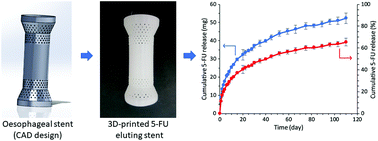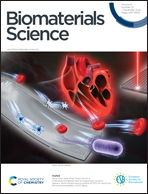Three-dimensional printed 5-fluorouracil eluting polyurethane stents for the treatment of oesophageal cancers†
Abstract
Oesophageal stents have been widely used to prevent occlusion or stenosis in the treatment of oesophageal cancers. However, stent restenosis caused by tumour ingrowth occurs frequently after stent placement. Incorporating anti-cancer drugs into endoluminal stents is a promising strategy to provide a sustained release of drugs to oesophageal malignant tissues while prolonging the retention of the stent and relieving dysphagia. Recognizing the potential of 3D printing to produce personalised stents with patient specific geometries, we herein report the development of a drug-loaded 3D printed stent for the sustained local delivery of 5-fluorouracil (5-FU) to treat oesophageal cancer. The 3D printed drug-eluting stents (DESs) were fabricated via fused deposition modelling using 5-FU-loaded polyurethane filament. Determination of the 5-FU in the filament and stent (>97%) confirmed that minimal degradation of the drug occurred during the thermal extrusion and 3D printing processes. The physicochemical properties of the stents were investigated using photoacoustic Fourier-transform infrared (PA-FTIR) spectrophotometry, X-ray diffraction (XRD), differential scanning calorimetry (DSC), thermal gravimetric analysis (TGA) and mechanical testing. In vitro release studies revealed that the drug-loaded stents provided a sustained release of 5-FU over a period of 110 days and allowed the constant diffusion of 5-FU when in contact with oesophageal mucosa. Furthermore, the 3D printed stents exhibited good stability following sterilization with gamma or UV irradiation, and during accelerated storage. This study demonstrates that 3D printing is a powerful tool for manufacturing DESs which could easily be customized to provide personalized, patient specific geometries and drug doses.



 Please wait while we load your content...
Please wait while we load your content...